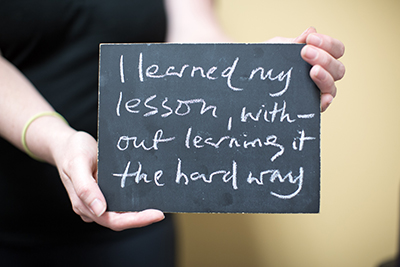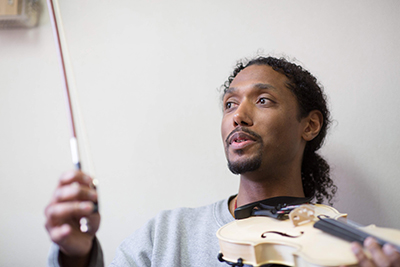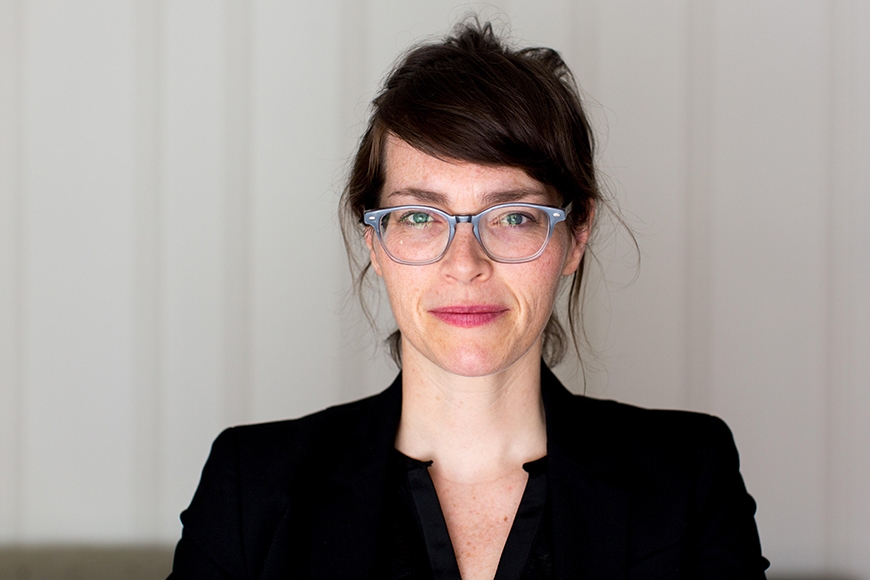Emily Baxter Knows We Are All Criminals
Did you ever use a fake ID? Shoplift when you were a kid? Drive drunk? English alum Emily Baxter (BA '02) would like you to think about what a difference it makes in a life to be prosecuted for minor (and major) offenses. With her We Are All Criminals (WAAC) nonpartisan nonprofit (and 2018 book), the former public defender presents the stories of those never apprehended who go on to good careers and stability—in juxtaposition with those arrested and incarcerated, who in the process often lose not only jobs but futures: opportunities for safe housing, college education, professessional and foster care licenses, and more.

The stories included in We Are All Criminals, Baxter has said, are “a catalyst for empathy”—for “breaking down the mental barrier people throw up to separate themselves from criminality. . . . Our criminal code is so overbroad that it is truly impossible to navigate the landscape without violating it from time to time. The response must be reasonable, rational, equitable. And it must be merciful."
The point of sharing stories, as SEEN—her recent portrait and poetry collaboration with Minnesota Prison Writers Workshop (MPWW)—underlines, is for the incarcerated to be truly seen, their humanity recognized: "seeing yourself," as the poet B writes in a quote included in the project, “or a piece of yourself, or a piece of someone you love, in me.”
With both SEEN and WAAC, Baxter is driven to disrupt the erasure of human beings that has enabled such a dramatic increase in incarceration that one in four Americans now has a criminal record. She believes that, confronted with the faces and thoughtful words of the imprisoned, “people on the outside” will join the fight to end the “this country’s mass incarceration disaster.”
How did an English undergraduate get involved with this work? “I’ve always been fascinated with other people’s stories,” Baxter notes. “It is, of course, what made English lit a good fit, but it’s also what drew me to documentary work and law.”
Baxter is driven to disrupt the
erasure of human beings that
has enabled this country's
mass incarceration disaster.
As an undergraduate, Baxter worked at the “long and sadly gone” Espresso Royale Caffe on Washington Avenue SE. Primed by her English classes, she viewed its student and professor regulars as “a daily character study: each of them too groggy or too caffeinated to filter what was on their mind.”
One day, she offered to help a fellow barista study for her LSAT. (“I used to take practice exams in high school for fun,” says the South Dakota native wryly.) After realizing she didn’t have the “saintly patience” to become an English teacher, she decided to take on the LSAT herself. Baxter earned a law degree in 2007 from the University of St. Thomas School of Law.
“After graduation, I found a job where stories—the ability to hear them and tell them—mattered,” Baxter relates. “I became an assistant public defender with the Regional Native Public Defense Corporation with the Leech Lake and White Earth Bands of Ojibwe. It was exhausting, exhilarating, meaningful, maddening work.”
The maddening part had to do with scale. “I wanted to be in a position where I could address the structural racism and colonialism that created and perpetuated injustice within our criminal legal system,” she says.

In 2009, Baxter departed for the Council on Crime and Justice, where she worked first as a rights-restoration attorney and later as the Director of Public Policy and Advocacy. In 2011, the Bush Foundation granted her a Leadership Fellowship to consider how best to advocate for criminal justice reform. Seeking to directly educate the public about the injustices of the legal system, Baxter initiated We Are All Criminals in 2012. From 2013 to 2015, she was a fellow at the University of Minnesota Law School’s Robina Institute of Criminal Law and Criminal Justice. She left the Council on Crime and Justice in 2014 to focus on WAAC.
As Baxter has crisscrossed the country gathering material for the WAAC website and book, she has shared the work with communities and corporations, including through a TED Talk. “From the start I enjoyed collecting and sharing stories,” says Baxter. “Now, I add photography to the mix. I love reflecting back what I see and hear in another person; I absolutely love it when a person who had been wary of a camera says, ‘Can you send me those? I need to post them.’”
Examples of Baxter’s empathetic eye can be found on the WAAC websit. And this fall, WAAC will be the organization in residence at the Weisman Art Museum. With Baxter's curation, poets and prose writers from SEEN will be paired with artists to co-create new work for exhibit at WAM.
While a student at the U, Baxter was inspired by classes with English professors Jani Scandura, Charles Sugnet, and David Treuer, as well as African American & African studies professor Rose Brewer (who is also affiliated with sociology; American studies; and gender, women & sexuality studies). Her advice for today’s undergraduates? “Step outside the campus bubble. Recognize that everything you study has deeper roots and broader implications.”
And read, of course. Below are Baxter’s book recommendations in the realm of criminal justice.
Must reads:
- The New Jim Crow: Mass Incarceration in the Age of Colorblindness, by Michelle Alexander
- Just Mercy: A Story of Justice and Redemption, by Bryan Stevenson
Deeper dives:
- American Prison: A Reporter’s Undercover Journey into the Business of Punishment, by Shane Bauer
- Let’s Get Free: A Hip-Hop Theory of Justice, by Paul Butler
- Are Prisons Obsolete? by Angela Y. Davis
- An Indigenous People’s History of the United States, by Roxanne Dunbar-Ortiz
- The Sun Does Shine: How I Found Life and Freedom on Death Row, by Anthony Ray Hinton
- Until We Reckon: Violence, Mass Incarceration, and a Road to Repair, by Danielle Sered
Local picks:
- Work from University sociologists Chris Uggen, Joshua Page, Michelle Phelps, Robert Stewart, and Veronica Horowitz
- This Is Where I Am, by Ezekiel Caliguiri
- Corpse Watching, by Sarith Peou
- Insane: America’s Treatment of Mental Illness, by Alisa Roth
- From Prison to PhD: A Memoir of Hope, Resilience, and Second Chances, by Jason Sole



